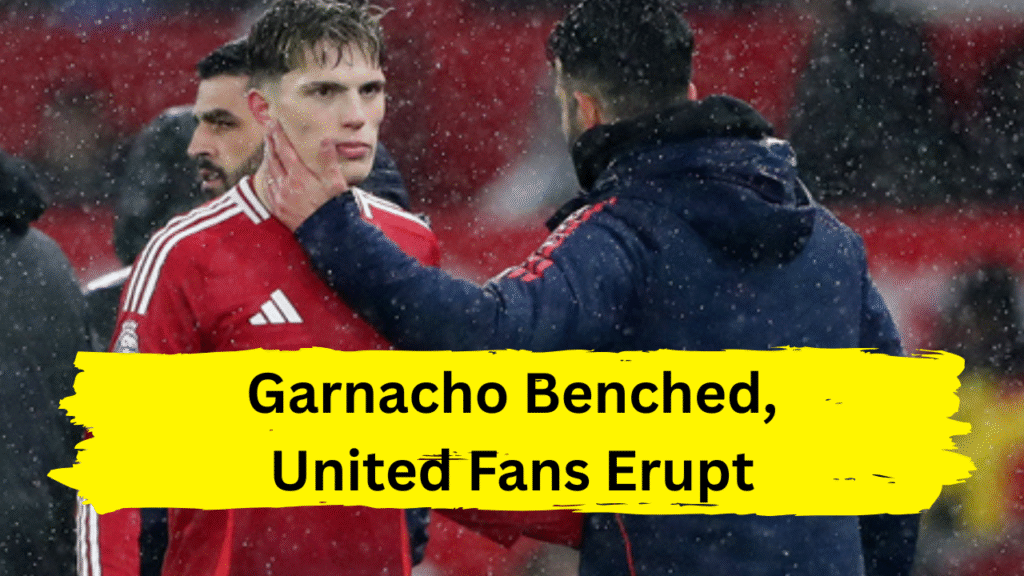The final whistle in Kuala Lumpur wasn’t just the end of a football match; it was the spark that ignited a raging inferno across Manchester United’s digital landscape. The shocking 1-0 defeat to the ASEAN All-Stars, a result that reverberated far beyond its friendly status, wasn’t merely a poor performance – it became a catalyst for a perfect storm of fan fury, tactical bewilderment, and simmering discontent about the club’s future. At the eye of this social media hurricane sat two figures: a benched young star and an unwanted managerial candidate, symbolizing the deep fractures within the United fanbase.
The Tinderbox: ASEAN’s Sting and Ten Hag’s Enigma
The humiliation was profound. Losing to a team of players assembled weeks prior, representing nations where football infrastructure is still developing, struck a raw nerve. Descriptions of United’s performance as “hapless” and “woeful” flooded timelines. But the result alone wasn’t the sole fuel. Manager Erik ten Hag’s team selection and in-game management became immediate flashpoints. Why, fans demanded, was a strong hybrid squad featuring established names like Fernandes, Casemiro, Maguire, Shaw, and Amad so utterly devoid of cohesion and fight against part-time opponents? The disconnect between the club’s global stature and the abject display was jarring, creating a tinderbox of frustration just waiting for a match.
The Garnacho Conundrum: A Symbol of Misplaced Priorities?
Then came the substitution that sent Twitter into meltdown. In the 60th minute, with United laboring and devoid of attacking spark, Ten Hag turned to his bench. But the name called wasn’t the electric Alejandro Garnacho, the teenager whose fearless running and directness had been a rare bright spot in a difficult season. Instead, it was Chidozie Obi, the 16-year-old academy prospect. While giving youth a chance is laudable, the context felt baffling. Here was United, trailing against a resolute defensive unit, desperately needing creativity, guile, and a proven game-changer. Garnacho, fit and available, remained rooted to the bench.
The hashtag #FreeGarnacho exploded. Memes depicting Garnacho looking longingly at the pitch from the bench went viral. Comments ranged from bewildered to furious: “Garnacho on the bench while we’re losing to ASEAN All-Stars is a crime,” one fan tweeted. Another lamented, “Ten Hag benches our most dangerous attacker when we need a goal most. What message does that send?” The decision was interpreted as everything from tactical incompetence to a petty punishment, a visible representation of the disconnect between the manager’s choices and the fans’ expectations. Garnacho’s omission, perceived as needless and damaging to the team’s chances of salvaging the game, became the lightning rod for broader dissatisfaction with Ten Hag’s decision-making.
Amorim’s Arrival: Boos Echo in the Stands and Across the Web
Simultaneously, another drama unfolded in the stands. Ruben Amorim, the highly-rated Sporting Lisbon manager and a name persistently linked with the United job should Ten Hag depart, was present at the Bukit Jalil Stadium. His appearance, likely coinciding with United’s Asian tour, was never going to be low-key. As cameras panned to him, a wave of audible boos rippled through the travelling United support. This visceral reaction wasn’t necessarily personal against Amorim, but a powerful vocalization of fan sentiment towards the club’s perceived dithering and the potential dismissal of Ten Hag.
Social media amplified the boos a thousandfold. Videos of the moment spread like wildfire. “The fans booing Amorim tells you everything. The board’s indecision is toxic,” observed one prominent fan account. Others saw it as a show of support for Ten Hag amidst intense speculation: “Fans making their feelings clear. Back the manager or sack him, but this limbo is killing us.” The booing crystallized the fanbase’s anxiety and anger about the protracted managerial saga. It underscored a deep unease with the club’s leadership – the Glazer ownership and football director John Murtough – and their perceived failure to provide clear direction, turning a potential future manager into an unwelcome symbol of the current chaos.
The Meltdown Multiplies: Fury Flows Unfiltered
With Garnacho benched and Amorim booed, the floodgates opened. Social media became a cathartic release valve for years of pent-up frustration:
- Targeting the Hierarchy: The Glazers and John Murtough faced relentless criticism. “£8 million for this embarrassment? Glazers out!” and “Murtough presiding over another shambles. Incompetence from top to bottom” were common refrains. The tour, seen as a cynical cash grab, backfired spectacularly.
- Player Performance Pilloried: While Garnacho was the benched martyr, others on the pitch faced the fans’ wrath. The lack of effort, poor passing, and defensive fragility were dissected mercilessly. “Casemiro looks finished,” “Maguire back to his ponderous worst,” and “Bruno invisible when we needed him” trended.
- Ten Hag’s Future Debated: The defeat intensified the debate around the Dutchman. Some saw it as the final straw: “Ten Hag has to go after that. No excuses.” Others, perhaps influenced by the Amorim booing, urged patience or blamed the players: “The players downed tools. Not the manager’s fault.” The Garnacho sub became a key piece of evidence for both sides.
- Mockery from Rivals: Unsurprisingly, rival fans reveled in the meltdown. Memes comparing the ASEAN defeat to historic lows, jokes about United’s decline, and gleeful sharing of the Garnacho and Amorim clips dominated football social media outside the United bubble, adding salt to the wound.
The Lingering Fallout: More Than Just a Bad Result
This wasn’t a typical post-defeat grumble. The ASEAN loss, coupled with the Garnacho benching and Amorim incident, exposed raw nerves and fundamental issues at Old Trafford:
- A Fanbase at Breaking Point: The reaction was visceral, immediate, and widespread, indicating a level of frustration bordering on despair. Patience is wearing dangerously thin.
- Leadership Vacuum: The booing of Amorim wasn’t about him; it was a referendum on the club’s indecisive leadership. Fans feel unheard and uninformed about the club’s direction.
- Manager-Player-Fan Disconnect: Ten Hag’s baffling Garnacho decision created a narrative of misalignment. Does the manager trust his players? Do the players believe in the manager? Do the fans trust either?
- Commercial vs. Sporting Reality: The tour, designed for financial gain, spectacularly highlighted the gulf between United’s commercial muscle and its current sporting credibility. The “brand” took a significant hit.
Kuala Lumpur’s Echo: A Club in Crisis Amplified Online
May 28th, 2025, in Kuala Lumpur, will be remembered not just for Maung Maung Lwin’s goal, but for the social media earthquake that followed. The image of Garnacho sitting unused while his team faltered, and the sound of United fans booing a potential future manager, became defining moments of a club in profound turmoil. The ASEAN All-Stars delivered a sporting humiliation on the pitch, but the real meltdown unfolded in real-time across Twitter, Facebook, and Instagram – a furious, unfiltered roar from a global fanbase witnessing what feels like an accelerating decline. The echoes from Bukit Jalil aren’t just of an upset; they are the deafening sound of a relationship between a colossal club and its supporters fraying dangerously at the edges. The road to Hong Kong, United’s next tour stop, feels longer and more daunting than ever, paved with the toxic fallout of a social media inferno.


